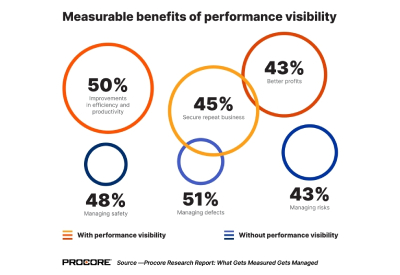Procore Survey Estimates Real-Time Data can Save Time for Construction Managers

May 28, 2021
Procore Technologies, Inc., a provider of construction management software, published the results of a new survey that found Canadian construction managers who can access real-time insights into performance are estimated to be saving 4.5 hours each week.
The study, What Gets Measured Gets Managed, focuses on the Canadian results of a survey that also included results from organizations in the United Kingdom and Ireland, France, Germany, the Netherlands and the United Arab Emirates. The research explores the impact of construction companies having real-time insights into their project management processes — or visibility of performance — through cloud-based software compared to traditional manual processes that can be more difficult to assess.
It found a correlation with having visibility of performance and time and money savings. Canadians surveyed estimated a time saving of 4.5 hours each week due to performance visibility (216 hours a year*). Weighted to the sizes of the companies and their labour costs, the results suggest an average annual savings of CAD$446,000 per business from having on-demand access to visibility of performance to avoid delays, rework and other performance gaps.
Visibility Making an Impact
Seventy-five per cent of Canadian respondents said their company’s level of visibility of performance is very high (21 per cent) or high (54 per cent). A quarter (25 per cent) said it’s moderate or worse. Visibility of performance is related to the tools commonly deployed.
Many Canadian respondents said they use manual tools such as spreadsheets (65 per cent), and experience challenges such as incomplete insights (34 per cent), duplicated insights (31 per cent) and incorrect insights (29 per cent).
Among those who have visibility of performance, half (50 per cent) have seen an increase in overall efficiency and productivity in the way their projects are run — the highest of any country surveyed; 51 per cent noticed fewer defects in projects. Almost half (48 per cent) claimed better safety records.
The survey also found Canadian organizations report different levels of performance visibility throughout the construction life cycle:
- Almost three-quarters (72 per cent) of Canadian firms with visibility of performance said this particularly applied to the build stage of projects (helping determine optimal cost or phasing, or reduce defects).
- A similar proportion (69 per cent) said they gained insights during the preconstruction stage (including better estimates of their project costs).
- However, only 46 per cent said they have performance visibility during the operate phase, in which companies schedule maintenance activities and monitor the performance of assets.
“Construction has lagged behind other industries in terms of technology adoption and digitization. This research shows that Canada’s construction industry is starting to see real signs of digital transformation,” said Harry Battu, Head of International Marketing, Procore. “As this transformation unfolds, roles in the industry will change. What won’t change is the need for a ‘single source of truth’ that connects all stakeholders.”
Half of Canadian respondents using artificial intelligence or machine learning
The results also show Canadians are looking ahead to new technologies and processes for better efficiencies and performance.
Artificial intelligence (AI) or machine learning is used by just over half of Canadian respondents (52 per cent) to assist with visibility of performance. Four out of five of those not using AI or machine learning said they would “definitely” (16 per cent) or “potentially” (64 per cent) consider using them to help achieve visibility of performance.
Additionally, nine in 10 (90 per cent) of Canadian organizations have shared information or insights with their supply chain to improve project performance. The top two benefits are better management of the supply chain and tracking progress of records needed to consider safety plans complete (both 40 per cent).
“Canadian firms’ willingness to share data and collaborate with their supply chains is evident from the survey, particularly among larger firms,” added Battu. “They find it enables better projects, with better time, cost and safety performance. These rewards can be quickly extended across the sector. By enabling performance visibility, smaller, more agile Canadian construction businesses can compete with larger firms, and help their project collaborators, large and small, to work smarter and faster, be more competitive, and achieve better and more resilient profit margins.”
The report, What Gets Measured Gets Managed, can be downloaded here: https://www.procore.com/en-ca/ebooks/what-gets-measured-gets-managed
Methodology
The survey was conducted online by Sapio Research on behalf of Procore in January 2021 among 820 middle managers and above, working for construction companies with 100 people or more in Canada, UK and Ireland, France, Germany, the Netherlands and the UAE. There were 154 Canadian respondents, representing the commercial, industrial, homebuilding/residential, fit-out and civil engineering sectors.
*Based on 48 working weeks a year











![Guide to the Canadian Electrical Code, Part 1[i], 26th Edition– A Road Map: Section 56](https://electricalindustry.ca/wp-content/uploads/2022/11/Guide-CE-Code-2.png)



